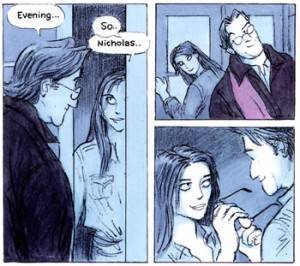Tamara Drewe
It seems that 2010 will be remembered as a boon year for movies derived from comic strips what with Kick-Ass, Scott Pilgrim vs. the World and the various Marvel and DC Comic franchise exploits there was also Tamara Drewe based on the graphic novel of the same name by Posy Simmonds which in turn was inspired by Thomas Hardy’s Far from the Madding Crowd and set in the fictional, sleepy Dorset village of Ewedown.
The story centres on a country retreat for writers run by Nicholas Hardiment (Roger Allam), a smug, successful, adulterous crime novelist and his loyal, doting wife Beth (Tasmin Grieg) their largely eccentric guests include Glen McCreavy an American academic who’s struggling to finish his latest book which, to echo the source material, is on the works of Hardy. When Tamara Drewe (Gemma Arterton) inherits her mother’s house she returns to the village where she grew up and was known as a troubled ugly duckling, now working as a journalist with a popular column she’s had a nose job and the remarkable change in her appearance stirs interest in the village’s male population.
Tamara enlists the help of Andy (Luke Evans) the odd job man to renovate the house for sale, ironically Andy’s family once owned the property but they fell on hard times, a further twist is that she lost her virginity to him back in the day and he clearly still has feelings for her. Tamara on the other hand doesn’t know what she wants and embarks on a wild fling with Ben Sergeant (Dominic Cooper) drummer and teenage heartthrob who she meets while reporting on the local rock festival and within days he proposes marriage.
Nicholas Hardiment is a serial philanderer and his long suffering wife has taken him back on numerous occasions. Things take an unexpected turn when Jody and Casey two teenaged girls with massive crushes on Ben Sergeant conspire to bring him back to the village when his relationship with Tamara turns sour whilst they’re staying in London for Christmas. Jody’s cockamamie plan involves sneaking into Tamara’s house whilst Andy, incidentally Casey’s Uncle, is decorating and secretly sending an email from Tamara’s computer to Ben asking him to come back for the “biggest shagging of his life”. Casey being the more sensitive of the two girls warns Jody not to send it, but Jody is undeterred and for some perverse reason adds Nicholas and Andy as recipients.
Chaos ensues; Ben is furious and breaks off his engagement to Tamara, Andy is disappointed that Tamara’s taste in men extends to the rapacious Hardiment but doesn’t realise that as a girl who hardly knew her own father she had harboured a secret crush on ‘Nicholarse’ whose fame as a writer she aspired to and somewhat inevitably the two of them now end up in bed together. The American Professor has found new inspiration for his book whilst falling for Beth Hardiment and when she discovers her husband’s fling too far with Tamara he is there to support her pursuit for a divorce.
As you can tell the plot is a suitably convoluted homage to Hardy’s late 19th century romantic potboilers, fuelled by unrequited love and repressed sexual passion and handled with great skill by director Stephen Frears who manages to keep it light and frothy but tackle some tough themes head on, such as spouse choice, infidelity and the lonely pursuit of an artful life; I won’t spoil the surprise ending but it’s fair to say all’s well that ends well.
Tamara Drewe is a refreshing British romantic comedy that’s both smart and funny, the hidef release has a sharp and vibrant 1080p transfer that lends itself to comic strip imagery, the rich greens of the countryside are balanced by the earthy browns and inky blacks evidently on show here, skin tones are also superb; Sony Pictures never miss an opportunity to show off the capabilities of Blu-ray and the 5.1 DTS-HD soundtrack is equally impressive. If for nothing more it will be remembered as Gemma Arterton’s best acting role since her breakout performance as Bond girl Strawberry Fields in the ghastly Quantum of Solace.







